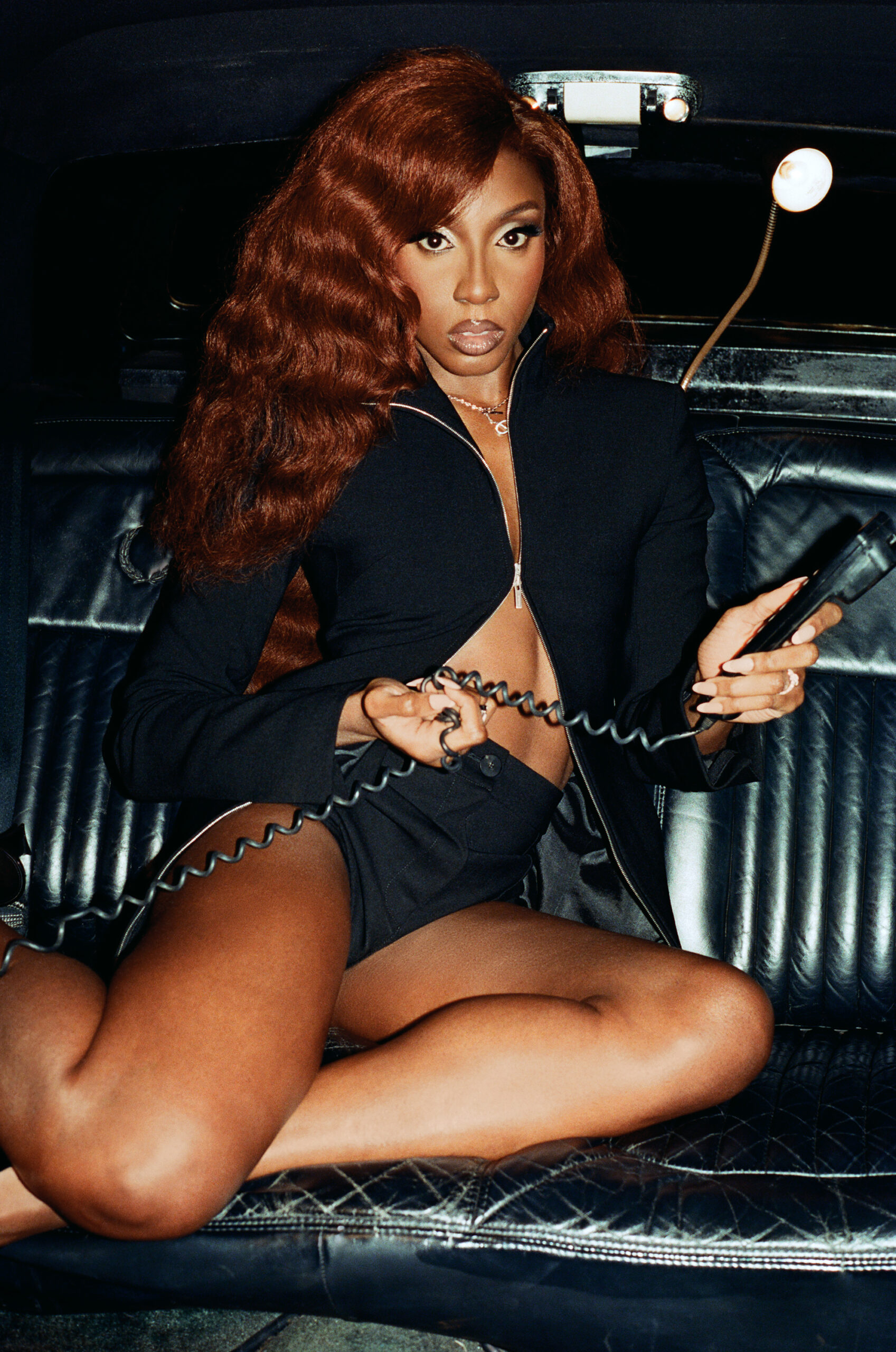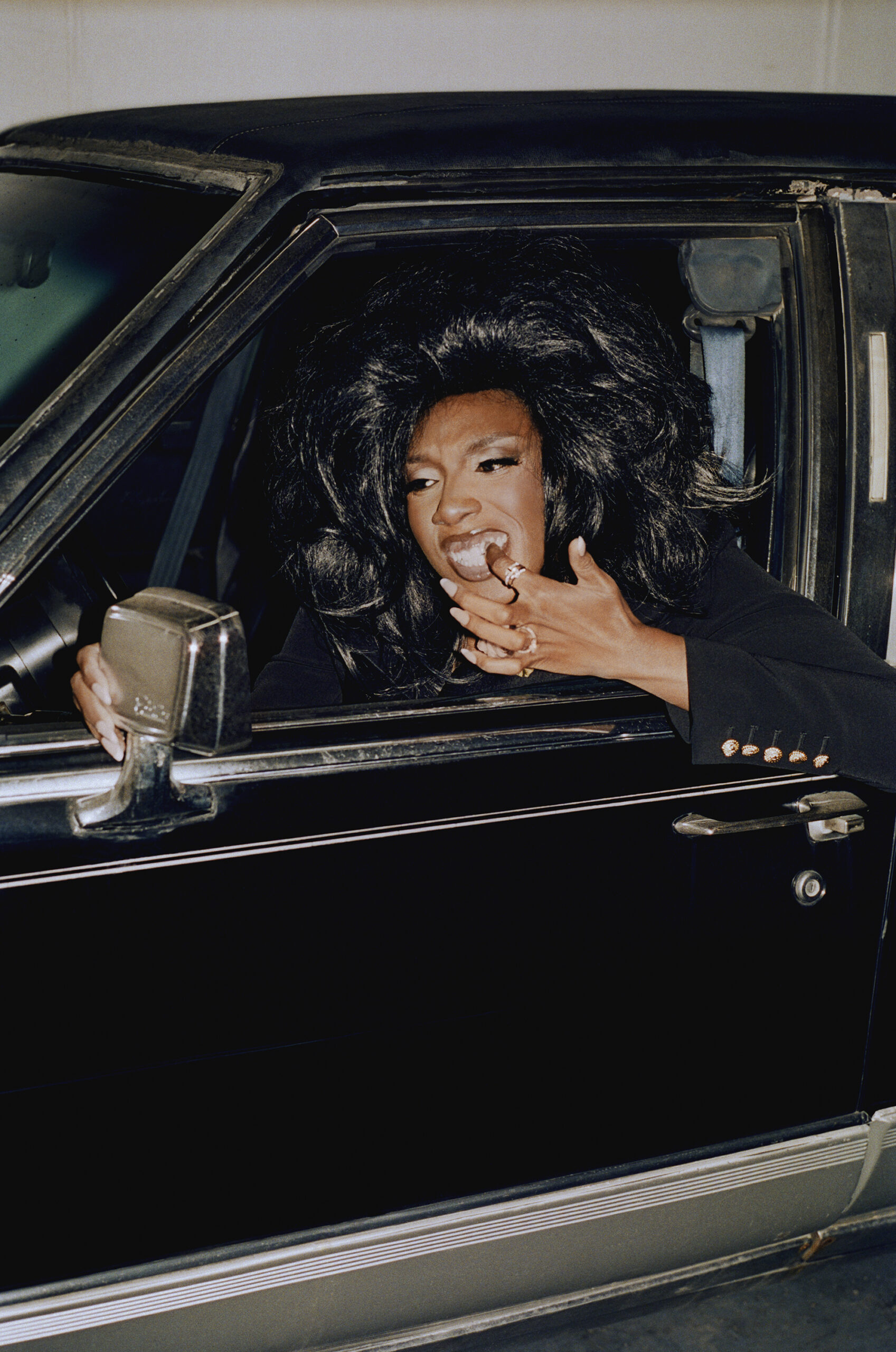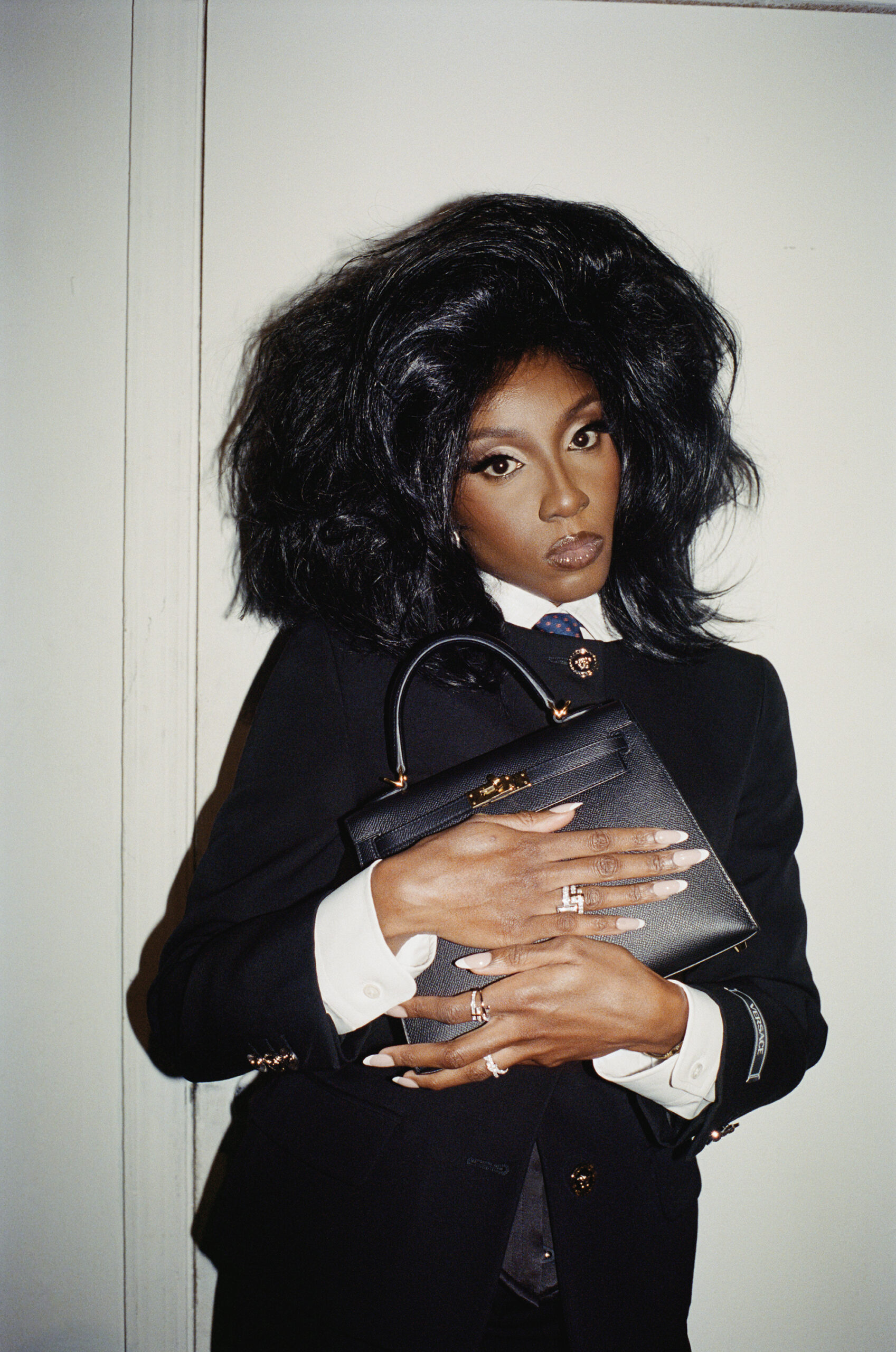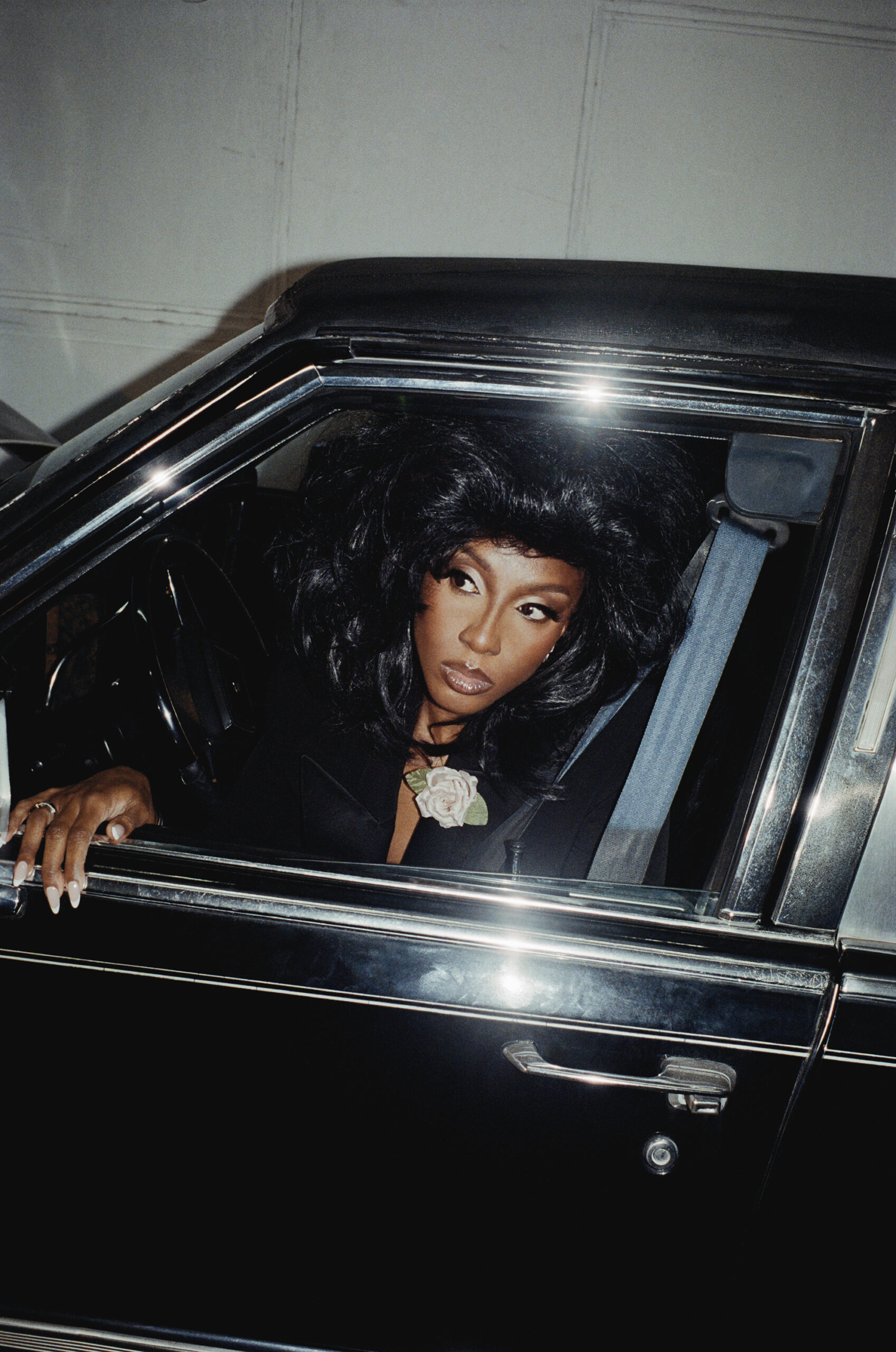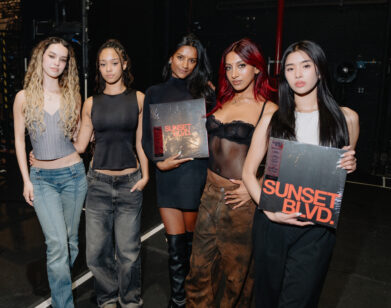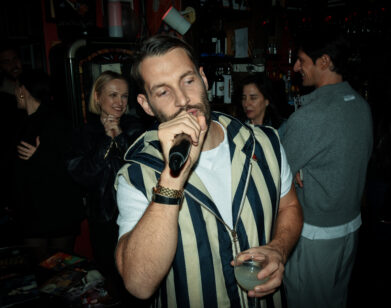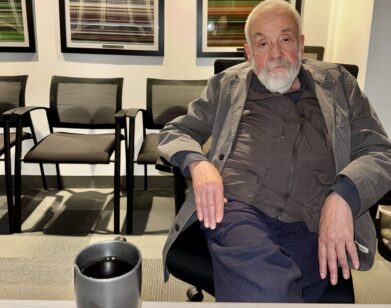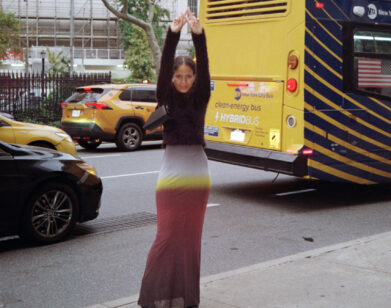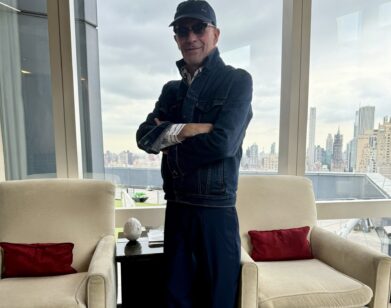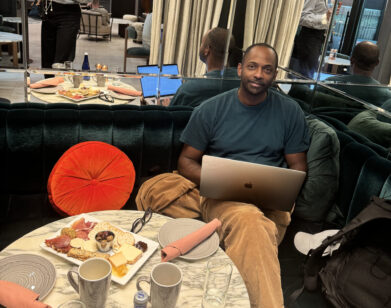comedian
“What Is Your Question Exactly?” Jeremy O. Harris gets Ziwe’d
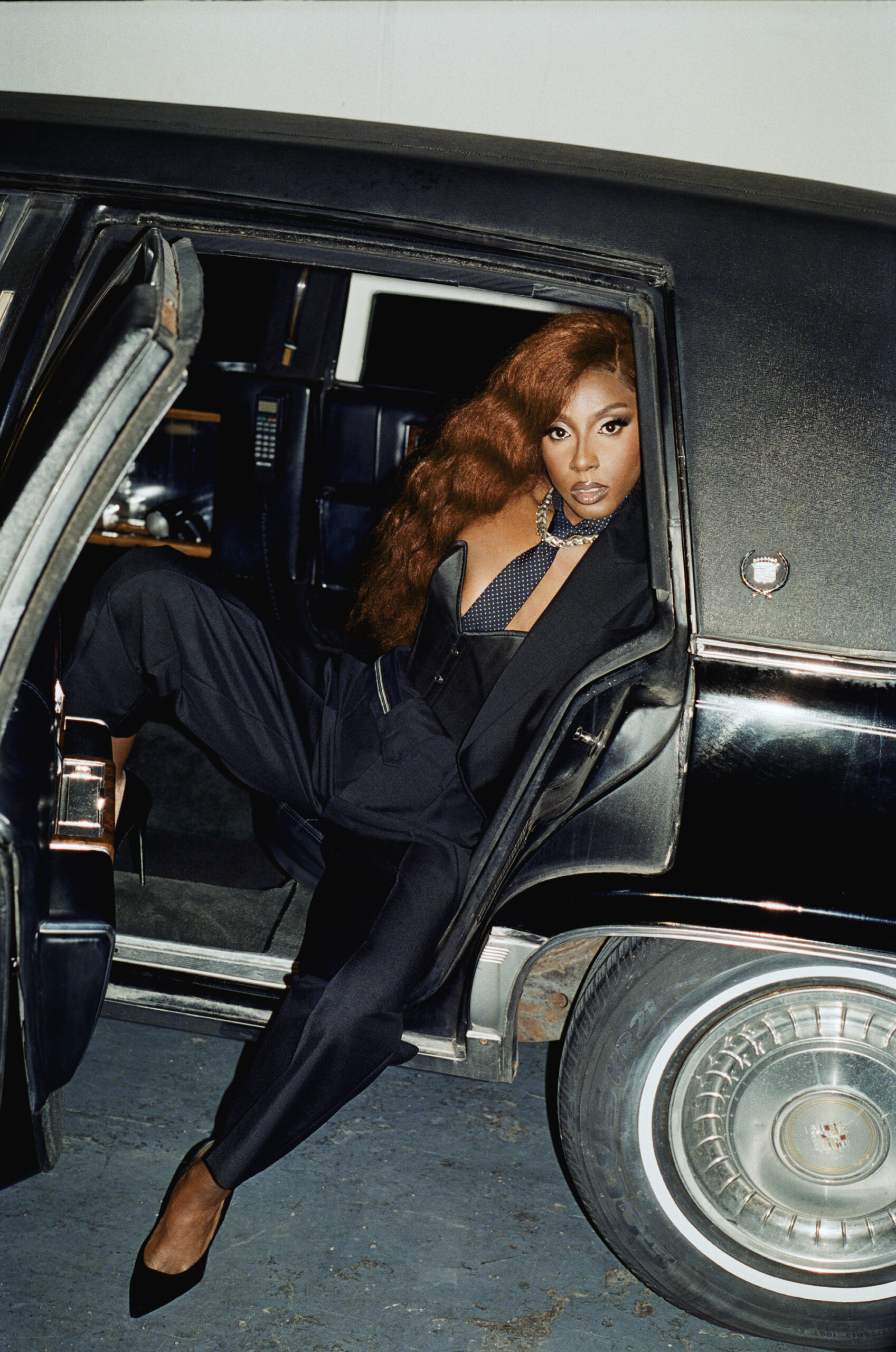
Ziwe wears Vest and Pants Fendi. Corset Agent Provocateur. Tie Hermès. Necklace Tiffany & Co. Shoes Gianvito Rossi.
A few weeks after dragging the disgraced scammer turned congressman George Santos in a sardonic interview on her newly revived YouTube channel, Ziwe dials into a Zoom call with Interview consigliere and fellow writer Jeremy O. Harris. The duo run in the same Hollywood-adjacent circles, yet Harris doesn’t seem to qualify for special treatment. When the comedian-slash-style icon turns it on, everyone is getting Ziwe’d.
———
WEDNESDAY 4 PM JAN. 10, 2024 NYC
JEREMY O. HARRIS: I’m so happy to see you on YouTube. You took a little reprieve and now you’re like, “Exclusive: We have George Santos.”
ZIWE: I couldn’t tell you that it was that intentional. There was a writers’ strike and an acting strike, and so I found myself—if I wasn’t working or going to a fashion week—at home finishing my book. But yeah, I interviewed George Santos two weeks ago.
HARRIS: We’re going to get to the book in a second because I’m obsessed with it, but I’m so curious about what inspired the urge to get back on camera with someone as infamous as George Santos.
ZIWE: I was intrigued by the fact that this character was a congressman. I started following him in January, when The New York Times broke the story that he wasn’t on the volleyball team at Baruch, and he didn’t actually work at those respective financial institutions. When all of these little tiny white lies had started to roll into larger lies.
HARRIS: Didn’t he say that one of his parents died in 9/11?
ZIWE: He did, allegedly. He also allegedly claimed while he was still in Congress that his grandparents were Holocaust survivors. I knew that the numbers for Republicans versus Democrats in Congress were really tight, so they needed him for that majority. But when he was disgracefully pushed out of Congress, I was really curious about who he was and how he could land one of the most important jobs in the American government. So I followed up on interviewing him in that way.
HARRIS: That’s so wild. I mean, there’s something old school about his method of ingratiating himself into the halls of power.
ZIWE: How so?
HARRIS: Well, foreign grifters were a big part of early American culture. Men would come from other lands and say, “Oh, I was the king of this village in Tunisia, that’s why I have this random thing. You guys should all buy it.” And the grifter would work for about a year and they’d run away. It’s harder to lie brazenly in the age of the internet. Do you think that you’re drawn to people like George Santos because they feel like explosive tabloid figures from a different time, in the same way that your comedy is built from a mode of inquiry from a different time? Or are these just your interests in general?
ZIWE: I don’t find myself to be nostalgic for a different time when it comes to how I interview guests, but I definitely pull from other interviewers’ techniques in how I investigate or question others. But it’s not a retro thing that I’m doing. It really is quite modern. The fascination with George Santos is not just born from my own head. It’s something that came to an eruption in the last month or so. It was at the center of American political conversation so I thought it was a really interesting conversation to be part of.
HARRIS: When you say that you’ve been more creative and focusing more on your writing, I think about the ways in which you’ve surprised people throughout your career. During the pandemic, your work was based purely in this interview format, this gotcha-type thing that took over our collective imagination for many, many months. But then you pivoted quite quickly and became a darling of the fashion world, and then a TV star. Now you’ve written a book and been published in The New Yorker. What fed the appetite to move your career into all of these different modes? Because we live in a moment when people feel very comfortable just doing one thing.
ZIWE: I feel the opposite. I feel that in the gig economy everyone is doing everything, whereas in the ’90s they could have one job and that would pay their mortgage. Now it’s like, “This person is the face of water, and also they’re doing a tour with their punk band, and they also have a fashion line.”
HARRIS: [Laughs]
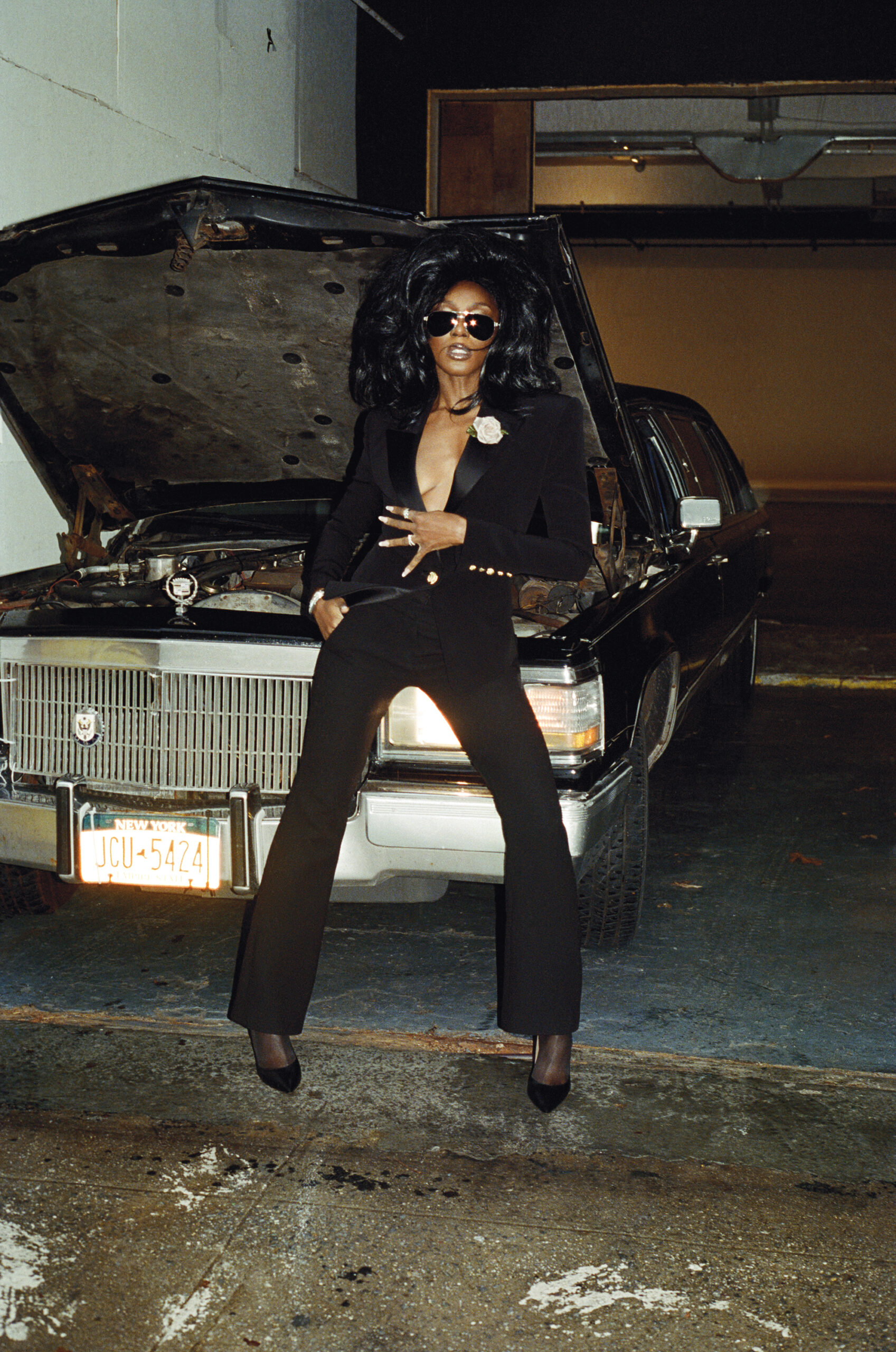
Suit Balmain. Bracelets and Rings Tiffany & Co. Sunglasses Cartier. Brooch M&S Schmalberg. Tights Wolford. Shoes Maison Ernest.
ZIWE: I exist in that tradition of having multiple jobs, it’s very Nigerian of me. But I think that stems from the fact that I started by trade as a writer. I studied writing in college. That was the first job I got in entertainment, so that’s always been the foundation. And with writing you know that there’s flexibility. Do you write poems? Do you write music? Do you write jokes? Do you write scripts? Do you write books? That’s allowed me to move through spaces and time. And then when you think about the other things I’ve added to that, like the fashion in my show formerly on Showtime—I always understood that video is a visual medium and fashion was part of the packaging. So I would say that while it may seem surprising, the ways in which my career has branched out recently have been part of a well-trodden path that I’ve been following for the last 10 to 15 years.
HARRIS: That’s beautiful. I read your book, and your prose has a sort of immediacy that tracks with the ways I feel when I’m having dinner with you, or the ways I felt watching your show. Anytime I see you, I’m seeing the fullness of Ziwe and not some fractured version of her, which I think oftentimes happens when people try to move to different mediums. You talked about the former Showtime show and I think that a lot of people, me being one of them, benefited from it. You had started to create this wonderful ecosystem for a lot of alt-comedians who were in your writers’ room. You don’t see someone like Cole Escola doing things for everyone, right? Same with Sydnee Washington. You were really uplifting your community. What were some of the lessons you took from doing that show, and would you do anything differently?
ZIWE: Oh. I’m proud that I was part of the alt-comedian-to-television pipeline. And Cole Escola and Sydnee Washington are so, so talented. As far as the lessons I learned, I think that I’m really, really fortunate in the path in which I found success. I had worked on several shows as a writer, so simultaneously, as I was a quote, unquote, “digital content creator” doing things on YouTube and IG Live, I also had this understanding of how the nuts and bolts of entertainment work. And so I could use each of those mediums to influence each other. So when I got to create a television show, I had a full idea of what I wanted it to be. That’s a blessing because you get a lot of notes and not every note is good, but every note will be told with confidence. And also, with notes, you either take it or you don’t take it, but you live and you die by it, because ultimately if the show’s a flop, it’s like, “Well, that was her fault.” So I’m fortunate that I had a strong perspective, and enough experience to understand what I wanted my show to look like, and we could move forward and collaborate with all these wonderful teams to create something together that could not have existed just in my mind’s eye. So the biggest lesson I learned from it was having a strong POV and being loyal to that because sink or swim, it’s on you.
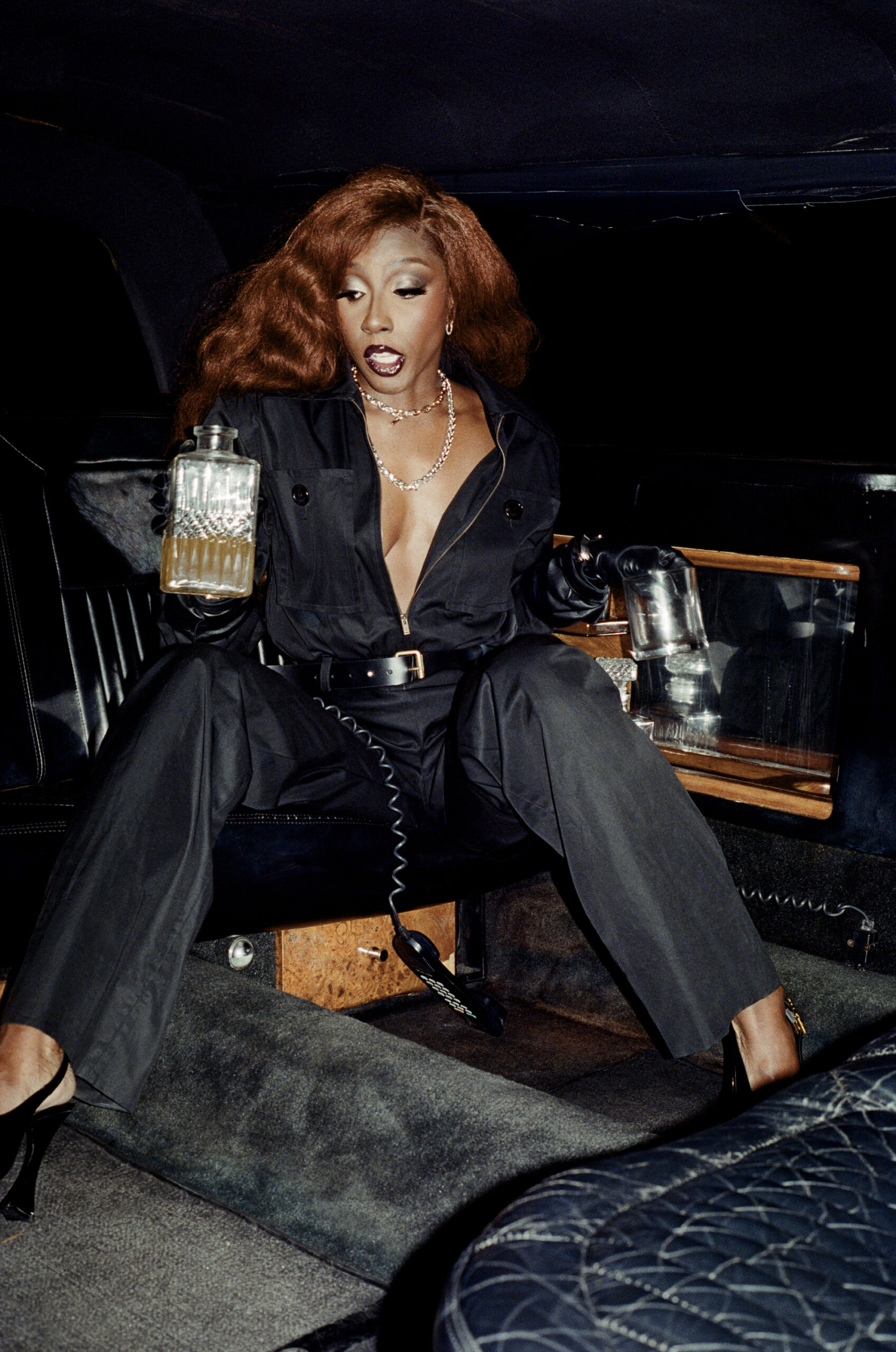
Jumpsuit, Gloves, Bracelets, Belt, and Shoes Saint Laurent by Anthony Vaccarello. Necklace (worn on top) Hermès. Necklace (worn on bottom) and Earrings Tiffany & Co.
HARRIS: Totally. A lot of these major streamers post-2020, or the “Racial Reckoning,” if you will, decided to put money and weight behind Black creatives. But from my experience, I felt like the farther we got from 2020, from people having read whatever book on white violence, the harder it became for film and TV execs to take in the complexity of the Black work that they had bought.
ZIWE: What is your question exactly?
HARRIS: My question is, did you find that there was more resistance to the way you wanted your work to be presented the farther we got from 2020?
ZIWE: I don’t know, because firstly, I shot every episode of my show in 15 days. We shot it mostly in 2021 and a little in 2022, and then it was canceled in ’23, right before the strike. So that’s not too far from 2020, for me to have that sort of observation. Maybe I could answer your question starting this year, but my show—I’m so into the anti-intellectual. It just has to be funny. Everything else is secondary. Because getting into the theory, it’s really tough, especially in these commercial pursuits where it’s a collaboration—
HARRIS: Yes.
ZIWE: Versus with my book, I felt really succinct. I was like, “Okay, let me reread this just so I understand exactly what James Baldwin was talking about, or Audre Lorde was talking about, or bell hooks was talking about, so I don’t sound like a dodo bird and I have cute references about American history.” Because that is all within the control of my pen, versus when you write something and you’re like, “Does it make people in the room laugh? How do we put that onscreen?” It’s a much more vibey experience.
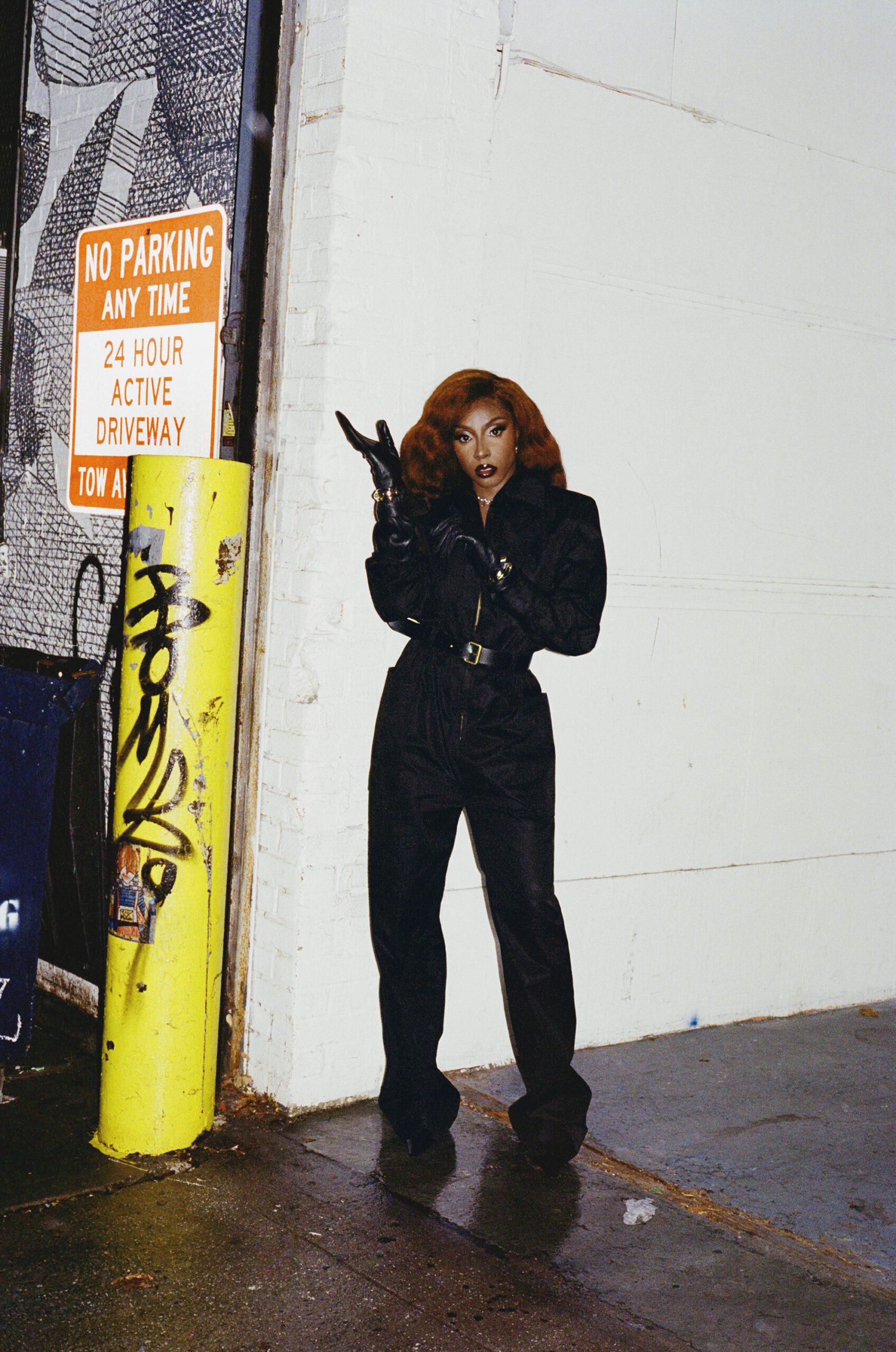
Jumpsuit, Belt, Gloves, Bracelets, and Shoes Saint Laurent by Anthony Vaccarello. Necklace (worn on top) Hermès. Necklace (worn on bottom) and Earrings Tiffany & Co.
HARRIS: One hundred percent. Do you feel like this experience made you hanker for more novel writing?
ZIWE: Writing a book is terrible. It’s really terrible. I don’t know if you’ve—
HARRIS: [Laughs] I’m writing my first book right now.
ZIWE: I also find that I’m a perfectionist. I was driving my editor wild. The book was about to be printed and we were doing page layouts and I’m making whole additions and subtractions of excerpts. So will I write another book? Probably. I’m really proud of the book that I wrote, and it was a labor of love, but wow, it took seven years off my life.
HARRIS: Seven years? That’s intense.
ZIWE: [Laughs]
HARRIS: And Ziwe the interviewer on YouTube, how long have you been doing that project and will we be seeing more of that?
ZIWE: I mean, I tweeted at George Santos on a Sunday, and we taped it four days later. [Laughs] It was out within two weeks of that first tweet. So that was a really tight turnaround. But I’ve been working through that process since 2016.
HARRIS: Wow. So that’s another seven years.
ZIWE: Exactly. I’ve been doing it since the YouTube version with Aparna Nancherla, Gary Richardson, and Pat Regan. When the Showtime show was canceled people would reach out to me and be, like, “Oh my gosh, I’m so sorry about this.” But I see it as just another iteration in many iterations. As for Instagram Live, a lot of people discovered me through that, but anyone who was an OG fan would know that this is just the latest version. George Santos’ interview is another edition of a long lineage.
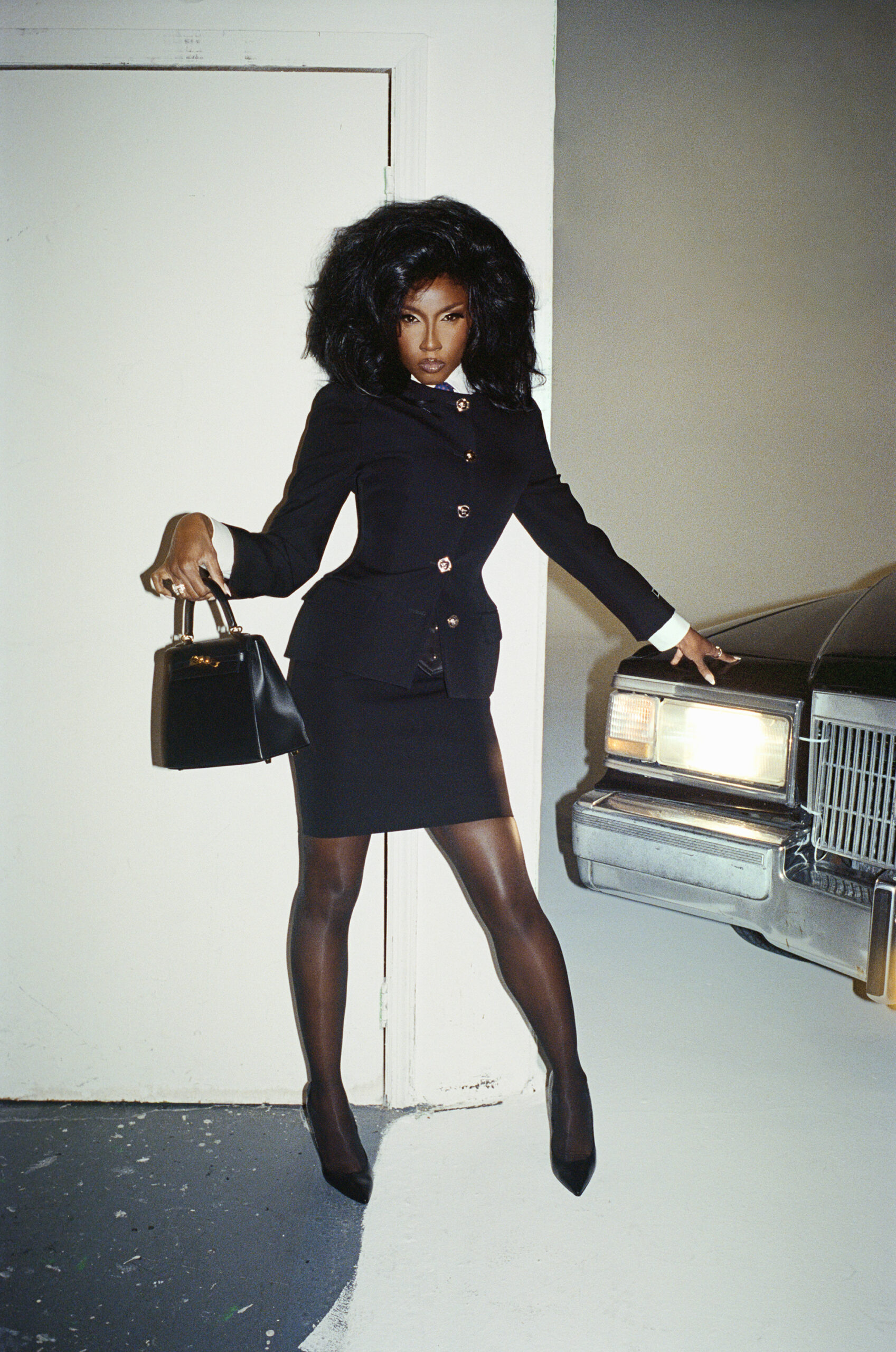
Jacket and Skirt Versace. Shirt Dunhill. Rings Tiffany & Co. Tie and Bag Hermès. Tights Wolford. Shoes Maison Ernest.
HARRIS: Right. I think that a lot of people in the comedy sphere, on Twitter at least, seem to have an obsession with that comedian Matt Rife. And I don’t know enough about comedy to care, but I do think a lot about one joke I have heard him say, which is that being hot is an obstruction to comedy.
ZIWE: It’s an obstruction to comedy, being hot?
HARRIS: Yeah. Despite being a hot man, he’s succeeded. And I wanted to ask you—do you think being a hot girl makes being a comedian harder?
ZIWE: Wow. I have to really sit with that. There are so many hot comedians that paved the way before me. Joel Kim Booster comes to mind as one of the first alt comedians to be really hot and brave about it.
HARRIS: [Laughs]
ZIWE: But I do think I should be included in the history books as one of the first comedians-slash-supermodels. I really broke those barriers. But I can’t say in all honesty that my looks have been a pejorative experience of my success. I think I’m very lucky that I have two legs that I can walk with and a symmetrical face. I think that ultimately it’s what’s coming out of your mouth that’s important, but it’s a visual medium, so a contour does help.
HARRIS: So what’s next for Ziwe?
ZIWE: World domination.
HARRIS: World domination?
ZIWE: Yes.
HARRIS: [Laughs] Ziwe, it’s always so fun.
ZIWE: Perfect.
———
Hair: Jadis Jolie using Redken and Mizani at E.D.M.A.
Makeup: Jamal Scott using MAC Cosmetics.
Nails: Nori using Chanel at See Management.
Photography Assistant: Andrew Espinal.
Fashion Assistant: Emmalynne Walpole.
Post-production: One Hundred Berlin.
Location: Be Electric Studios.
Special Thanks: Veloce Picture Cars.

